Over 1,300 Iranian Retirees Refused Benefits For Nearly 20 Years
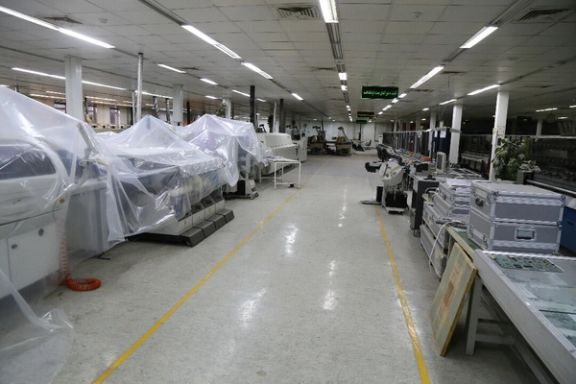
For almost two decades, nearly 1,300 retired workers for a telecommunication company in Iran have not received their benefits, wages, and pensions, according to the workers’ union.

For almost two decades, nearly 1,300 retired workers for a telecommunication company in Iran have not received their benefits, wages, and pensions, according to the workers’ union.
Speaking to the semi-official state broadcaster ILNA, Hashem Shamshiri, the head of the retirees’ union, lamented the authorities' failure to fulfil their promises to compensate the workers for the company based in Shiraz in southwestern Iran.
About 125 retirees passed away, before receiving their benefits.
Despite pledges by the company to resolve the retirees' claims before the Persian New Year in March, the workers have yet to be given their wages.
The retirees have resorted to protests on numerous occasions, including in 2021 when they held a rally in Shiraz, and their demands for their rights were met with violent attacks by the state police.
The lack of compensation has impacted at least 1,000 households – leading to much frustration among the families and retirees.
The company owes 1,300 retirees about 1 trillion Rials in wages, damages and accrued interest. At the current exchange rate, this amount is approximately $1,200 USD (770 million Rials) per retiree. However, before the steep devaluation of Iran’s currency in 2018, this amount would have equaled tens of thousands of dollars per retiree.
The company has reportedly faced economic hardships after its privatization in 2005. As the main investor in Iran Telecommunication Industry (ITI), Asia Tech Company holds the key role in resolving the nonpayment of employees.
Disregard for workers’ rights is not an isolated incident limited to ITI — but, part of an ongoing crisis faced by many workers in Iran across multiple sectors including education, oil and gas, and steel.
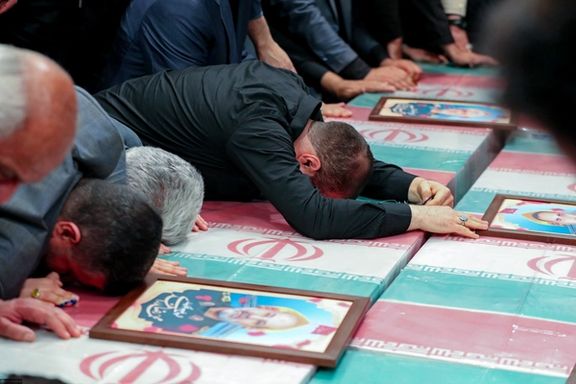
Iran may keep Israelis in a state of anticipation and apprehension for a while but will eventually retaliate for the attack on its embassy in Damascus last week, analysts say.
Israeli Foreign Minister Israel Katz says Israel has not taken responsibility for the attack that killed seven top Iranian Revolutionary Guard commanders, but in his Eid al-Fitr sermon on Wednesday, Iran’s Supreme Leader Ali Khamenei held Israel responsible and promised retaliation.
Iranian officials and media have largely been silent on Friday over the prospects of a retaliation, but after reports of an attack being imminent, Khamenei’s X account retweeted the same remarks without further comments.
Two US officials told CBS News that a major Iranian attack against Israel was expected as soon as Friday, possibly to include more than 100 drones and dozens of missiles aimed at military targets inside the country. The White House National Security Council spokesman John Kirby also said on Friday that an Iranian strike on Israel was possible.
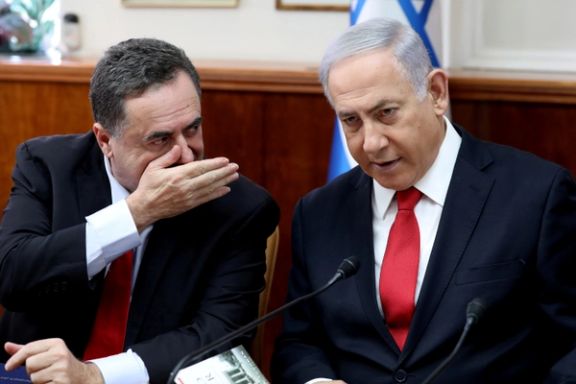
Most analysts believe the Israeli strike on the Damascus embassy that the Iranian regime calls “Iranian soil” has left no other choice for the Islamic Republic than to strike back as a matter of principle and honor.
“They will retaliate but will try to keep Israelis on their toes and perplex them as long as they can before initiating an attack,” an analyst in Iran who requested anonymity told Iran International.
“For instance, they may deploy a hundred missiles to one location in the country, then move them to another. Or put their forces in a state of high alert in one place, then rescind the decision without explanation, or move them to another location,” he added.
Reports from Israel Friday indicated that Iran's use of this psychological warfare tactic has already made a lot of Israelis very nervous.
Iran International’s correspondent Babak Itzhaki in Jerusalem reported on Friday that the feeling is prevalent in Israel that the Islamic Republic and Israel’s exchange of threats and warnings has reached a final point and caused worry to the public.
Rather than preparing to get together for Sabbath as they always do, Israeli families are staying home to remain close to their safe rooms, he says, adding that municipalities are preparing themselves for some sort of attack and have been ordered to open up shelters to people if Iran's threats materialize although new instructions have not been issued so far for extra measures.
A source in Tehran told Iran International that while people are preoccupied with various local issues and controversies, the looming threat of escalation, potentially culminating in an Israeli attack on Iran, is a cause for concern. Their primary worry revolves around the potential further rise of the US dollar in Tehran and the subsequent increase in the severity of their living conditions. The Iranian currency, the rial, has depreciated by 30 percent since early January, exacerbating inflation, which is already hovering around 50 percent.
Iranian sources and diplomats from the US say Tehran has signaled to Washington that it wishes to avoid escalation and will not act hastily, Reuters reported.
“Iran wanted condemnation of Israel’s attack on the Iranian embassy by the United States, western countries and the United Nations Security Council as Foreign Minister Hossein Amir- Abdollahian pointed out,” the Iranian analyst said, adding that the only way for the Islamic Republic to hold off an attack and not to lose face is getting a big concession. “They may be maneuvering now to increase the price of holding off an attack on Israeli soil,” he added.
Iran has already begun exhibiting its preparations. According to the semi-official Iranian Students News Agency (ISNA) which cited the Army, the air defense chief of northern Iran, Brigadier General Amir-Mohammad Sadeghian, on Friday inspected “the combat readiness, equipment, and response protocols” of the force.
"It's going to be very difficult for Iran not to retaliate," Raz Zimmt, senior researcher at Israel's Institute for National Security Studies also told Reuters.
"I still believe that Iran doesn't want to engage in full-scale, direct military confrontation against Israel, and certainly not with the United States. But it has to do something," he added.
Follow developments on Iran International's Live coverage of ongoing tensions between Iran and Israel.

The European Union is imposing sanctions against three Hamas and Palestinian Islamic Jihad entities, over “widespread sexual and gender-based violence” that occurred across Israel on October 7.
“The Council decided today to list three entities under the EU Global Human Rights Sanctions Regime in view of their responsibilities in the brutal and indiscriminate terrorist attacks that occurred across Israel on 7 October 2023,” a press release read.
The sanctions target the Al-Quds Brigades, the armed wing of the Palestinian Islamic Jihad, the Nukhba Force (special forces unit of Hamas) and the Qassam Brigades (military wing of Hamas).
Israel’s Foreign Minister, Israel Katz, took to X to laud the decision, saying it “sends a clear message: those who murder, rape, burn, abuse the bodies of babies, girls, women, and men, and commit atrocities against humanity -- will pay the price.”
Individuals and entities listed under the sanctions regime face an asset freeze, meaning their financial assets are blocked. Providing them with funds or economic resources, either directly or indirectly, is prohibited. Persons listed are also banned from traveling to the EU.
The EU had already classified Hamas and the Palestinian Islamic Jihad as terrorist entities.
Last month, the UN Special Representative on Sexual Violence in Conflict reported that she and a team of experts found “clear and convincing information” of rape and sexualized torture being committed against hostages seized during the 7 October terror attacks.
Pramila Patten said that in addition there are also reasonable grounds to believe that such violence, which includes other “cruel, inhuman and degrading treatment”, may be continuing against hostages still being held by Hamas and other extremists in the Gaza Strip.
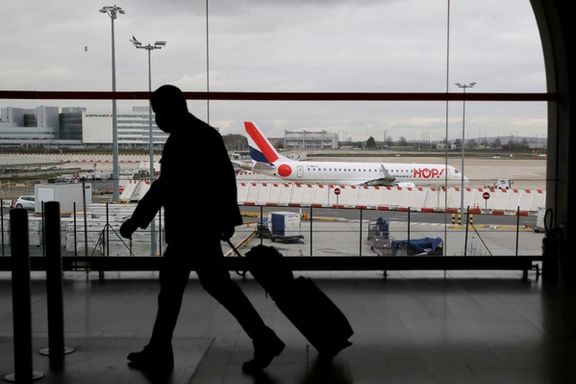
France has issued a travel advisory today, urging its citizens “imperatively” to refrain from traveling to Iran – as well as nearby Lebanon, Israel, and the Palestinian territories.
The warning comes amid Tehran's threats of retaliation, after a widely-believed Israeli attack on Iranian consulate premises in Damascus on April 1, which killed seven Islamic Revolutionary Guards Commanders.
French Foreign Minister, Stephane Sejourne, has meanwhile called for the evacuation of the family members of French diplomats in Iran – and for no French civil servants to be deployed to any of the listed countries.
Britain, Canada, and Australia have also issued travel advisories urging their citizens to refrain from visiting Iran, Israel, the West Bank, and Lebanon.
This week, German airline Lufthansa extended its suspension of its flights to Tehran due to the situation in the Middle East.
The conflict ignited by Hamas' attack on Israel on October 7 has intensified regional volatility to levels not seen in years – and has brought the shadow war between Iran and Israel to the forefront today.
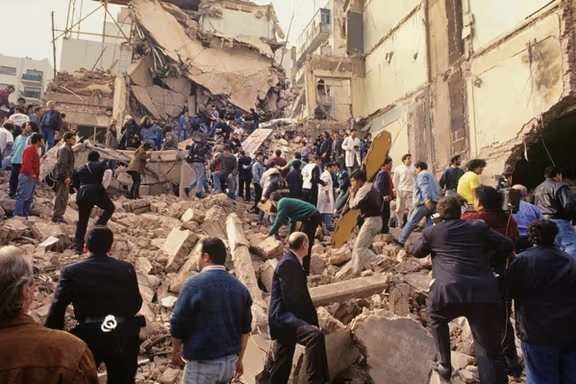
Argentina’s highest criminal court has ruled that Iran ordered the deadly 1992 attack on Israel’s embassy in Buenos Aires and the 1994 attack on AMIA Jewish community center, which killed more than 100 people.
Describing the attack on the Asociacion Mutual Israelita Argentina (AMIA) Jewish center as a “crime against humanity,” Argentina’s Court of Cassation deemed Iran and its Lebanese proxy, Hezbollah, responsible for the bombing and declared Iran a “terrorist state.”
In 1992, a bomb attack on the Israeli embassy left 29 dead. Two years later, a truck loaded with explosives drove into the AMIA Jewish center and detonated, leaving 85 dead and 300 injured – the deadliest terror act in Argentina’s history.
“The significance of these grave human rights violations for the international community as a whole invokes a state’s duty to provide judicial protection,” the ruling said.
The court also highlighted the role of the Iran-backed Shiite militia group Hezbollah for the attack. "Hezbollah carried out an operation that responded to a political, ideological and revolutionary design under the mandate of a government, of a State," Carlos Mahiques, one of the three judges who issued the decision, told Radio Con Vos, referring to Iran.
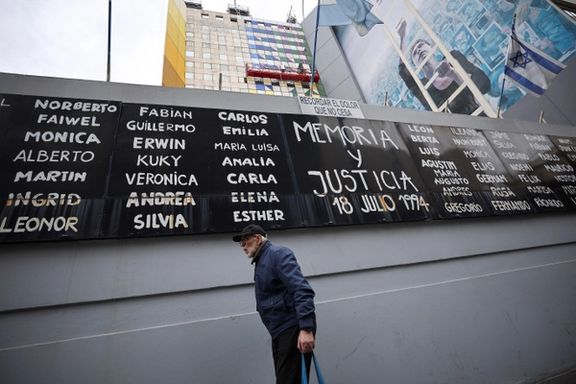
According to court documents cited by local media, the attacks came in retaliation for Argentina reneging on a nuclear cooperation deal with Tehran. Argentina canceled three contracts in the mid-1980s that would have supplied Tehran with nuclear technology.
The AMIA attack has never been claimed by any group or solved, but Argentina and Israel have long suspected Lebanon's Shiite Hezbollah group carried it out at Iran's orders. In 2006, Argentinian courts pressed charges against eight present and former high-ranking Iranian officials, alongside a Lebanese national, in connection with the attack. Interpol arrest warrants for the convicted officials have led nowhere.
Citing confidential intelligence reports, the court directly implicated top Iranian officials and commanders of the Revolutionary Guard in the bombings.
In 2007, Interpol General Assembly upheld the unanimous decision made by the organization’s Executive Committee to publish six out of nine Red Notices requested in connection with the AMIA.

The notices were requested by the Argentinean National Central Bureau (NCB) for Imad Fayez Moughnieh, the number two in Iran-backed Hezbollah, Iran’s Former Intelligence Minister Ali Fallahian, Cleric Mohsen Rabbani – known as the chief architect of Iran's Latin American missionary network -- Iranian diplomat Ahmad Reza Asghari – aka Hamid-Reza Es’hagi and Moshen Ranjbaran. Revolutionary Guards commander and incumbent Interior Minister Ahmad Vahidi as well as President Ebrahim Raisi’s former vice president for economic affairs, Revolutionary Guard’s commander Mohsen Rezaei (Rezai), were also among them.
Argentina has the largest Jewish community in Latin America, with some 300,000 members. It also is home to immigrant communities from the Middle East, particularly from Syria and Lebanon.
The ruling of the Thursday court session was welcomed by the president of the Delegation of Israelite Associations of Argentina (DAIA), Jorge Knoblovits. He told Radio Mitre the ruling "is very important, because it enables the victims to go to the International Criminal Court."
Past inquiries into the bombings have turned up indictments, not just against Iranian officials but also two former Argentine presidents. In 2015, the chief prosecutor in the case was mysteriously found dead in his bathroom the day before he was to go public with claims that top Argentine officials had conspired with Iran to cover up responsibility for the bombing.
Former Argentine president Carlos Menem, who died in 2021 and was the president at the time of both attacks, was tried for covering up the AMIA bombing, but ultimately acquitted. His former intelligence chief Hugo Anzorreguy was sentenced to four-and-a-half years in jail for his role in obstructing the probe. Along with a dozen other defendants, he faced a multitude of corruption and obstruction of justice charges in the case. Among them was Juan Jose Galeano, the former judge who led the investigation into the attack. In 2019, Galeano was jailed for six years for concealing and tampering with evidence.
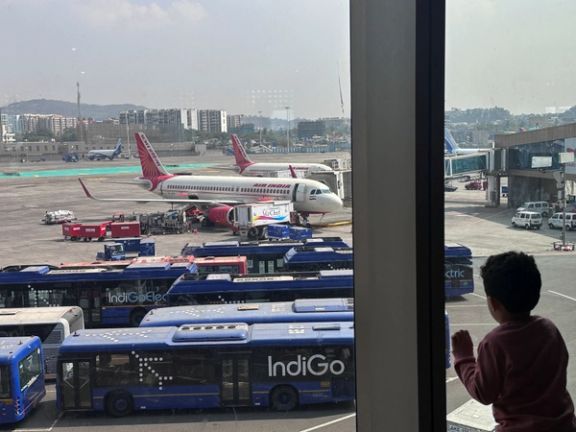
India advised its citizens on Friday against travelling to Iran and Israel until further notice in view of the "prevailing situation in the region".
The advisory from the foreign ministry came amid Iran's threats to retaliate against an Israeli airstrike on its consulate in Syria this month.
Countries including the US and Russia have issued similar travel advisories for their staff and citizens in the region.
India's foreign ministry said its citizens in the two countries should observe "utmost precautions about their safety and restrict their movements to the minimum".
It is feared that retaliation by Iran can widen the six-month old conflict between Iran-backed Hamas militants and Israel in Gaza.
The US has reached out to the foreign ministers of Saudi Arabia, UAE, Qatar and Iraq, asking them to urge Iran to lower tensions with Israel, as part of its efforts to contain the conflict.
The region and the United States have been on alert for an attack by Iran since April 1, when Israeli warplanes bombed the Iranian embassy compound.
On Thursday, Germany's Lufthansa extended a suspension of its flights to Tehran with the Middle East on alert for the possible Iranian retaliation.
(Reporting by Reuters)






